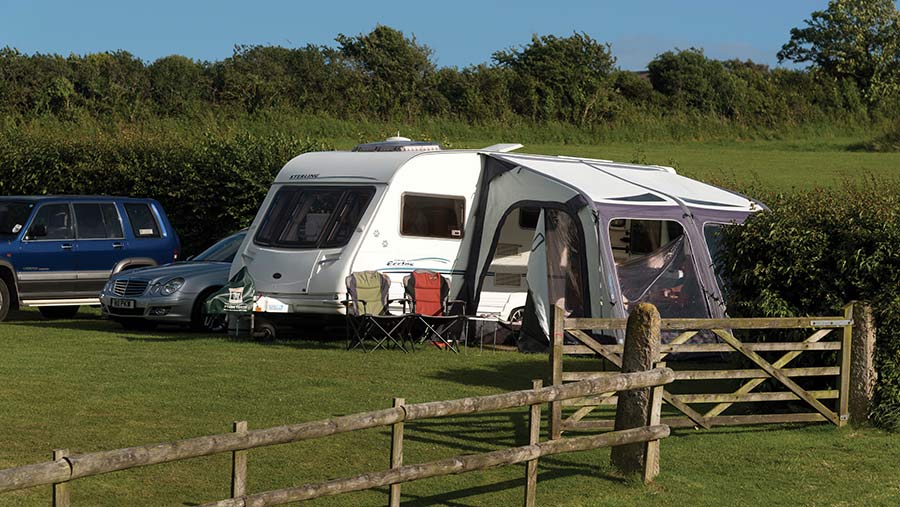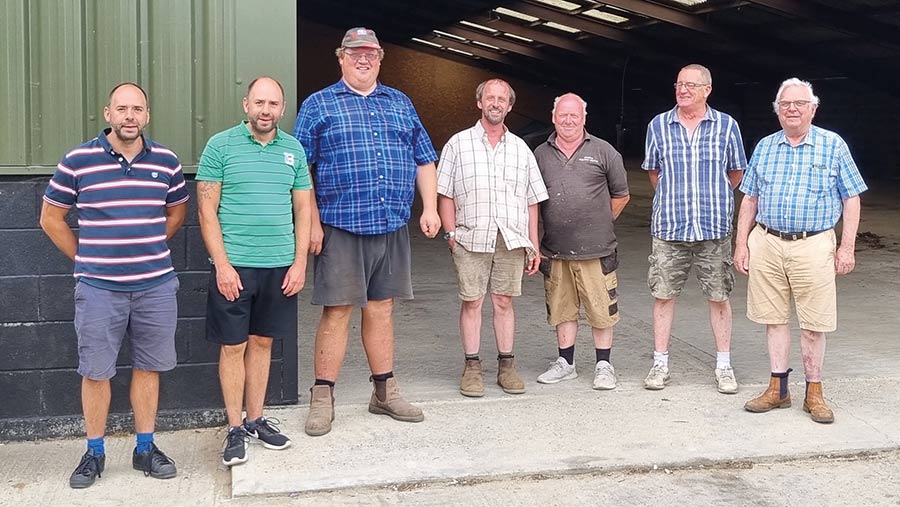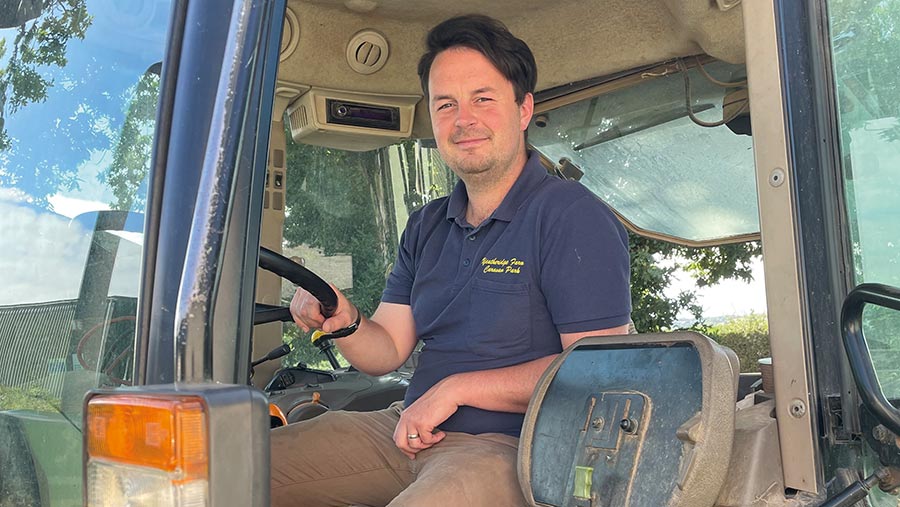So you want to….offer caravan storage
 © AdobeStock/Petert2
© AdobeStock/Petert2 The domestic holiday market has grown since the pandemic was declared. As a result, secure caravan storage is in high demand, presenting an opportunity for farm businesses. Debbie James reports
Many providers of secure caravan storage are now operating waiting lists because of a big spike in caravan sales.
Becci Bailey, manager of the Caravan Storage Site Owners’ Association (CaSSOA), says the organisation is actively looking for new members in England, Wales, Scotland and Northern Ireland.
See also: So you want to…run a care farm
“Some storage providers are being paid in excess of £800 annually for each caravan, depending on the geographical location and level of security,’’ she says.
It can therefore provide a good income for farmers with land or a building to spare.
So what is involved? Planning permission, business rates and security are all key considerations.
1. Planning permission
In the majority of situations, caravan storage requires change of use planning consent.
The type of approval mostly needed is ‘B8 – Storage and Distribution’ to include outside storage.
Ms Bailey says that in granting permission, a planning authority may attach conditions to the maximum number of caravans that can be stored, opening hours, site landscaping and security recommendations.
Site operators must comply with all the conditions attached to the consent because if they don’t permission can be withdrawn, or enforcement action taken.
“Our advice would be to start small when it comes to planning permission, seeking further permissions for expansion later on,’’ says Ms Bailey.
2. Business rates
Business rates are payable with the amount determined by the rateable value of the property.
The Valuation Office Agency sets the value on caravan storage sites and this is normally done by comparing the site with rental evidence of commercial storage land in the area.
Rateable Values can be found using the property’s postcode at www.2010.voa.gov.uk/rli/en/basic/find
However, many storage operators have successfully challenged the rate set for their businesses, so if the assessment seems high, take specialist advice about appealing.
“CaSSOA can access a range of specialist advice for rate appeals,’’ says Ms Bailey.
Some business rate relief may be available too.
Ms Bailey says operators should factor the cost of business rates into their calculations for the annual storage fee.
3. VAT
If the gross income from the site exceeds the current threshold of £82,000 then VAT is payable at the standard rate of 20%.
Inheritance Tax – Business Property Relief
For the purposes of Business Property Relief (BPR) from inheritance tax, caravan storage is not classed as a business.
It is categorised as the ‘making or holding of investments’ and, as such, it does not ordinarily qualify for BPR, but this can be contested by specialist taxation and legal experts.
4. Site fees
Fees are influenced by the quality of the site, its geographical location, and the economics of the area.
On average, a year’s storage for a single axle caravan is charged at about £370; twin axle caravans and motorhomes are usually larger therefore the fee charged can be higher.
Undercover storage will usually generate a higher fee too.
5. Storage contract
CaSSOA strongly recommends the site owners have written contracts with caravan owners, with this agreement setting out the conditions of storage and do’s and don’ts on site discipline.
If there is a dispute, the terms of the contract are binding for both parties.
All contracts must be ‘fair and reasonable’ in their terms, and meet the requirements of Unfair Terms in Consumer Contract Regulations 1999.
CaSSOA advises that a contract term can be deemed unfair if it creates a ‘significant imbalance’ in the positions of the trader and consumer.
Terms must also be in plain language; if they are not then the interpretation which favours the consumer will apply.
“Proprietors need to be aware that plot holders may take advantage of a site where there is no written contract,’’ says Ms Bailey.
6. Public liability insurance
Public liability insurance is essential.
This is because the nature of caravan storage allows people to be on the site for a specific purpose.
“There will always be the potential for an accident, and therefore insurance should be in place for such eventualities,’’ says Ms Bailey.
“In the event of any incidents or changes that may affect the insured risk, always notify the insurance company as soon as possible.’’
Failure to make a prompt notification may invalidate a claim, she cautions.
“If there is any doubt about notification, always err on the side of caution and notify your insurer,’’ Ms Bailey adds.
7. Security
Caravan storage sites can be a target for theft.
Although the risk tends to be lower in rural areas compared to sites close to towns and cities, it is still a potential threat so good security is paramount.
CaSSOA recommends a combination of physical and electronic security measures.
“The combination should deny or delay access to any intruder and increases the likelihood of detection,’’ says Ms Bailey.
A 3-3.6m high perimeter fence is a must, either palisade or welded mesh. Security gates should be hung on anti-lift hinges.
Electronic access gates are preferred as key entry poses security risks, says Ms Bailey. “Key fob entry would be ideal,’’ she says.
Electronic perimeter beam protection is a good deterrent and CCTV is recommended too. “There are a huge range of quality, affordable CCTV systems now which can be linked to mobile devices for 24/7 monitoring, Ms Bailey points out.
8. Site layout
As a general rule, an acre of land can accommodate about 60 caravans, depending on the caravan size and site layout.
As a rough guide to estimating the potential viability of a site as storage, CaSSOA advises that each stored caravan should be allocated around 30 square metres.
The individual parking bays should be 8m long, with access roads at least 8m wide.
The space recommended between each caravan – hitch post to hitch post – is 3.5m.
Case study: Grove Farm, Woodbridge, Suffolk

Barry Crick (right), with Grove Farm manager Andy Ryley (fourth from left) and the farm team © Andy Ryley
A 929sq m farm shed that once housed dairy cows and pigs is now generating income as a caravan storage facility.
The site at Grove Farm at Hollesley Bay, Woodbridge, Suffolk, is owned by pig farmer Barry Crick and managed by Andy Ryley.
The shed had been built as winter housing for dairy cows and more recently housed pigs but when Mr Crick decided to concentrate his pig farming operations on two other sites, it became redundant.
It was his manager, Mr Ryley, who suggested that the site would be a good match for caravan storage and offer a new income stream for the business.
Up to 30 caravans can be stored there at any one time, but it is not restricted to caravans.
“We have motorhomes, classic cars, even speedboats,’’ Mr Ryley explains.
There is a monthly charge of £60 a vehicle inclusive of VAT, paid via direct debit, but the owners only pay for storage when their vehicle is parked there – there is no holding charge for when they take it out of storage.
But notice has to be given ahead of a caravan being removed. “Ideally we like to have a month’s notice,’’ says Mr Ryley.
There are options for long term storage, with new customers given a month of free storage in the first 12 months.
Security is a priority. “We have made the building very secure, it is a requirement from the insurer,’’ says Mr Ryley.
Among other security measures there is a key fob entry system and CCTV.
The numbers of vehicles stored at any one time varies with the seasons.
“At this time of the year it is quite empty because many owners are using their caravans for the summer but in the winter it is very full,’’ says Mr Ryley.
The owners, he says, are good people to deal with. “They are mostly very easy going and friendly.’’
Other farm buildings have been converted too, for storage and as business premises – in the past two years, 12 units have been created.
Case study: Yeatheridge Farm, East Worlington, Devon

© James Hosegood
An exceptionally wet summer was the catalyst for the Hosegood family’s diversification into caravan storage.
They already operated a caravan and campsite on their beef and sheep farm at East Worlington, Devon, when heavy rainfall in 1983 prevented some owners from towing their vehicles off the site.
“They asked if they could leave their caravans here and that’s how it all started,’’ says third generation farmer James Hosegood, who runs the business with his parents, Geoff and Liz.
The farm now has 400 caravans stored at Yeatheridge Farm.
The business model is a different one to the mainstream – only caravan owners who use the caravan site at Yeatheridge Farm can store their vehicles in the compound; they might holiday at the site for a month or so every year and store their caravan there for the other 11 months.
There is a weekly charge of £8 for outdoor storage but for every week owners use the caravan site there is a discount of £1, up to a maximum of £3, to encourage use of the caravan park.
“It is quite a lot cheaper than other storage businesses but that is because they can only use the caravan on our caravan park,’’ Mr Hosegood explains.
As the holiday diversification side of the business has grown, farming activities have been scaled back– it was once a dairy farm but there is now a flock of Dorset sheep and small herd of Devon cattle.
Mr Hosegood admits the caravan storage business was a “godsend’’ during the pandemic.
“We didn’t get any income from the holiday site but we didn’t lose any of the storage business.’’
For farmers who are considering venturing into storage, Mr Hosegood advises that site security is paramount.
The business already had good physical security measures in place when 12 caravans were broken into in 2021 and water heaters stolen.
As a consequence £100,000 has been invested in fencing, CCTV and beam technology.
If farmers think that storing behind a padlocked gate is good enough they need to think again,’’ says Mr Hosegood.
“It used to be the value of the van that attracted criminals but now it is the parts and the bits inside.’’
He doesn’t allow owners into the storage compound – when they want to remove their caravan to use on-site, he moves it with a tractor, to prevent any other vehicles getting damaged.
Mr Hosegood also advises that farmers often over-estimate how many vans they can store when they have a shed they are planning to use. He suggests using CaSSOA’s guidance on this.
